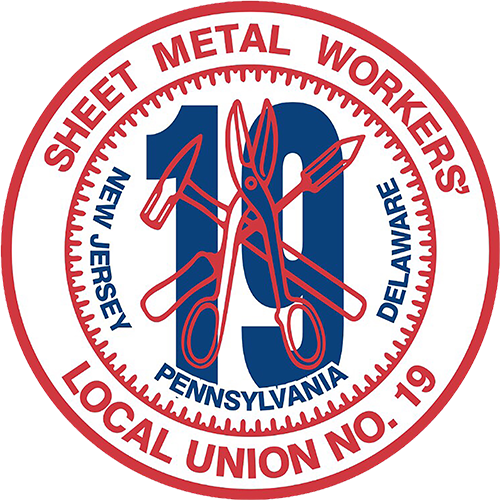Raising Cane’s Chicken Fingers expansion into the mid-Atlantic region was an opportunity for Local 19 to forge a new partnership and demonstrate our superior skills and quality craftsmanship. Raising Cane’s team needed to ensure their new locations reflected the brand’s commitment to quality, and Local 19 proposed a collaboration that would benefit the company, workers, and the community Raising Cane’s serves.
A Proposal of Partnership
Recognizing Raising Cane’s dedication to excellence, Sheet Metal Workers’ Local 19 understood that the company needed a partner who could deliver precision craftsmanship, on time and on budget. Local 19 reached out directly to Raising Cane’s, suggesting a collaboration that would align with their core values. Our proposal wasn’t just about the construction of the new and future locations—it was about a lasting partnership, focused on providing unparalleled expertise in specialty metalwork, efficient project delivery, and strengthening the communities Raising Cane’s calls home.
Members Jesse Watson and Mike Wick played a pivotal role in supporting Organizers Mike Dougherty and Brian Heino, working under the guidance of Assistant Business Manager/Business Agent Luke Gordon to help forge the partnership.
The Tour of South Jersey Metals
To showcase their capabilities, Local 19 invited Raising Cane’s representatives to tour South Jersey Metals, one of our signatory specialty metal shops. Upon arrival, the team was greeted by skilled union workers eager to demonstrate their craft. From custom stainless steel kitchen equipment to intricate architectural metalwork, the shop showcased the possibilities available through local union labor.
Raising Cane’s team witnessed firsthand the meticulous attention to detail that Local 19 members bring to their work. They saw the fabrication of sleek countertops, durable hoods, and signage that could seamlessly fit the brand’s aesthetic. The highlight of the visit was a demonstration of how South Jersey Metals could create bespoke features tailored to Raising Cane’s unique design specifications.
Benefits of Local Labor
As the visit concluded, Local 19 leaders shared how partnering with union labor extends far beyond the job site. By using skilled, local workers, Raising Cane’s could ensure:
- Unmatched Quality: Union members undergo extensive training through apprenticeship programs, such as the one offered by Local 19, ensuring the highest standards of craftsmanship.
- Timely Project Delivery: With a workforce of over 4,300 members, Local 19 could meet tight deadlines without compromising quality.
- Cost-Effective Solutions: Through direct hire agreements Raising Cane’s could save money while providing family-sustaining wages for local workers.
- Community Impact: By hiring locally, Raising Cane’s would inject money into the local economy, support union families, and foster goodwill in the communities they serve.
The Ripple Effect on Communities
By employing local labor, Raising Cane’s would help create stable, well-paying jobs that support families and drive economic growth. Union members, in turn, contribute to the community by spending their earnings locally, volunteering, and advocating for workers’ rights. This cycle of investment and reinvestment strengthens neighborhoods, ensuring that businesses like Raising Cane’s thrive alongside the communities they serve.
A Future Built Together
Impressed by Local 19’s craftsmanship and commitment, Raising Cane’s began exploring opportunities to collaborate on their projects in Glassboro and Blackwood, New Jersey. Local 19 members at WF Smith, Restaurant Ventilation Design (RVD), and South Jersey Metals played a key role in delivering high-quality HVAC, kitchen equipment, and signage installation, fabrication, and special metalwork. Across both sites, that partnership generated roughly 1,600 work hours for our members and provided an excellent opportunity to showcase that skilled labor is key to success for an end-user like Raising Cane’s. By investing in local union labor, Raising Cane’s ensures top-tier quality while strengthening community ties, creating restaurants that residents will be proud to patronize for years to come.
The Raising Cane’s in Glassboro is now open to customers, and the Blackwood restaurant is on track to open in February. We encourage our members, families, and friends to patronize these establishments!
In the end, the story of Local 19 Sheet Metal Workers and Raising Cane’s is one of shared values and mutual benefit: a celebration of quality, community, and the power of local labor to build a brighter future for everyone involved.







